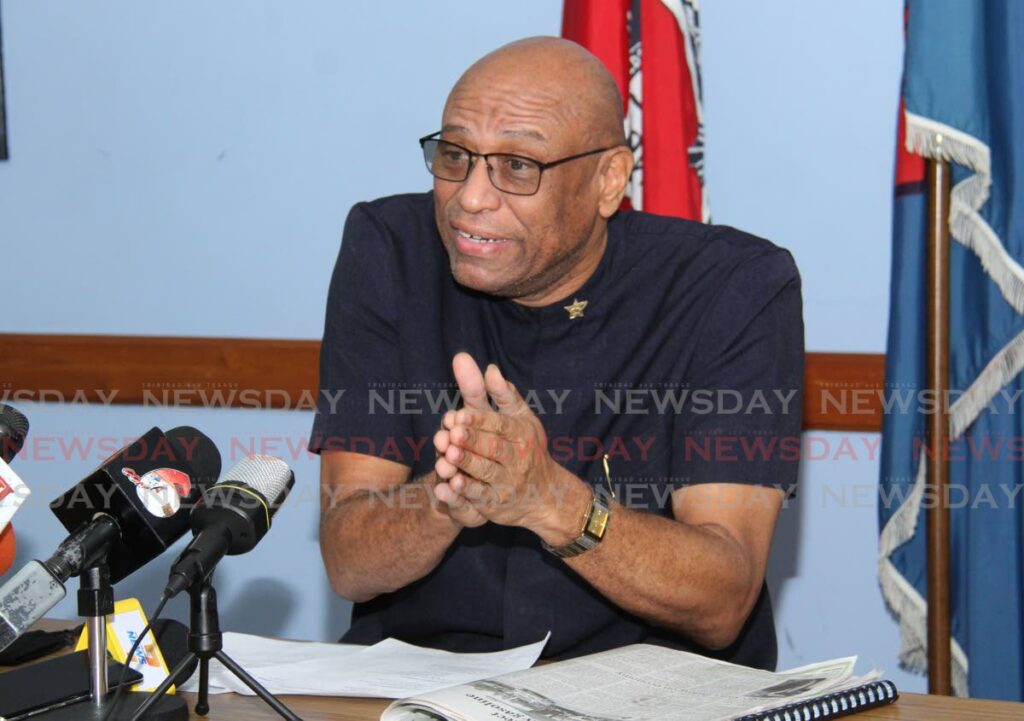
THE Oilfields Workers’ Trade Union (OWTU) is accusing Finance Minister Colm Imbert of misleading the country about T&TEC’s $7 billion debt to NGC.
OWTU’s president general Ancel Roget, in a statement on Friday, said major parts of the story have been omitted, such as the government’s debt to the electricity company.
He also said this should not be reason for an increase in electricity rates for residential customers. Instead he called for multinationals to pay more for electricity, which they use to generate huge profits.
In his statement, Roget sought to explain and put in context the reason for T&TEC’s indebtedness to NGC.
He claimed Imbert deliberately omitted to inform the population that all of NGC’s original founding assets were built by T&TEC.
“The construction of the modern gas-powered plant in Penal in 1953 required a network of pipelines to provide the gas to the plant. These lines were subsequently extended to Point Lisas to power two generators at FEDCHEM and, later on, to power the establishment of the Point Lisas power station.
“In the early 1980s, the government decided that T&TEC would sell these valuable assets to NGC, which was then called the GAS Co., for $1. Whilst T&TEC was not compensated for its investment in these assets, NGC became a very profitable state enterprise.” He said over the years, big companies have received subsidised electricity rates at the expense of T&TEC and grown their profit margins on the backs of workers.
He referred to a newspaper report in which Imbert was quoted as saying the electricity company owes the National Gas Company (NGC) $7 billion.
“Additionally, he (Imbert) claimed, that the government subsidises T&TEC $700 million annually and the country cannot afford to continue to subsidise T&TEC.
“Note carefully, this is the identical narrative they used for shutting down Petrotrin in 2018. The article also refers to NGC blaming T&TEC, arguing that the debt prevents the gas company’s growth.”
Roget said he believed Imbert’s statements are intended to justify the privatisation of T&TEC and send workers home.
He submitted that the “so-called subsidy” should be viewed in the context of government’s owing T&TEC some $900 million for electricity, suggesting that the sums owed should cancel each other at the national level.
“The government is both the sole shareholder and a major bad-paying customer of T&TEC,” Roget said, alluding to the intense pressure the debt has on the commission’s cash flow and overall financial position.
He said the second major issue that is really crippling T&TEC, “are the onerous power purchase agreements (PPA’s) with the bulk supply of electricity, eg, Incogen and TGU.”
T&TEC, he recalled, was once a fully integrated power utility, generating, transmitting, and distributing electricity, which made it into a profitable entity at the time.
Privatisation in 1994 saw a share of Government’s profit going to multinational companies instead.
“Since then, two additional bulk suppliers were established in addition to Powergen. The relationship between T&TEC and the bulk suppliers is governed by onerous PPAs which mandates T&TEC to pay for all electricity generated whether or not it is used.
“Through these PPAs, the bulk suppliers have been given every advantage to operate profitably at T&TEC’s expense, making billions in profit every year, while T&TEC faces severe financial challenges.”
Roget observed, “That like other state enterprises, there has been increased politicisation of T&TEC
“The government runs T&TEC by politics rather than proper policies,” he claimed.
A close examination of the board, he said, “will reveal that there are not suitably qualified and experienced persons such as engineers as directors on the boards of T&TEC, Powergen and TGU.
“In addition, T&TEC was forced to do without a board for an extended period because of PNM’s political infighting as to whom the chairman should be.”


